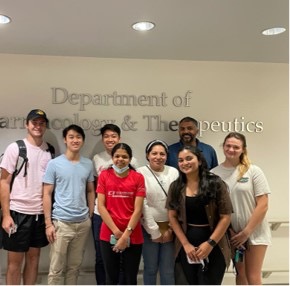
Research Overview
What motivates us? Motivation is the drive to perform actions to achieve goals, and is crucial for survival. In neurobiology, motivation is regulated by combination of movement (action) and reward/pleasure (reinforcer), which ensures that an animal achieves its goals consistently. Lack of or too much motivation can be harmful, and has been implicated in the etiology of various disorders such as depression, schizophrenia, ADHD, Parkinson’s and drug addiction. Dopamine is at the center of regulating movement, reward-based learning and motivation, and dopamine dysfunction has been implicated in all of the above disorders. The goals of our lab are to identify and map neuronal circuits that regulate dopamine signaling, motivation, movement and reward, by using state of the art tools such as viral tracing, opto/chemogenetics, fiber photometry, and operant behavioral conditioning. Deciphering the mechanisms that regulate dopamine neuronal circuits and motivation will allow us to develop novel therapeutic strategies to treat disorders such as addiction, depression and schizophrenia.
What we are doing in our lab
Research Focus Areas
• Drug Discovery
• Neuropharmacology
• Neurodegeneration
• Psychiatric disorders
• Dopamine

what you would learn in our lab
Research Tools & Skills
• Cell Culture
• Neuron tracing
• Microdialysis
• Behavioral pharmacology
• AAV and Lentiviral production
• Fiber Photometry GCamp & dLight/GRABda
• Immunohistochemistry & microscopy

Current & up to date publications
Recent Publications
Check out the recent publications from the Primary Investigator (PI), Dr. Nikhil Urs

Contact the PI
Dr. Nikhil Urs

Check out our Website
Urs Lab Website

Check out our Twitter
Urs Lab Twitter
twitter.com/nikhilurs


